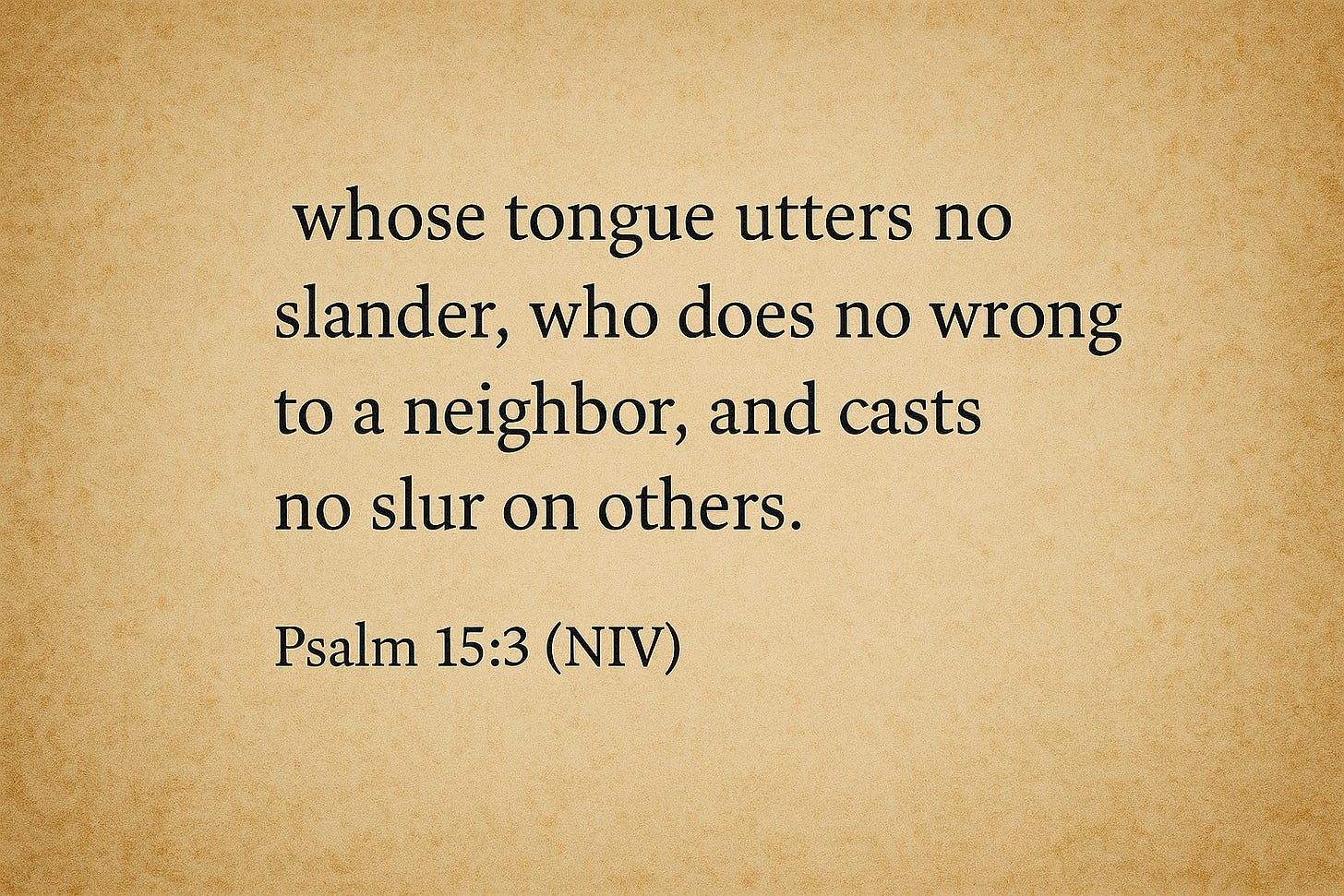The one whose walk is blameless
Psalms 15:2-3 - Righteousness is not an achievement, but something that is actively and continuously pursued through deeds that reflect God’s character.
This image was created using DALL·E, OpenAI’s legacy image generation model.
“The one whose walk is blameless, who does what is righteous, who speaks the truth from their heart; whose tongue utters no slander, who does no wrong to a neighbor, and casts no slur on others;”
Psalms 15:2-3 NIV
There are 2,461 verses in the Book of Psalms, which makes up about 7.9% of the Bible. I’ve become very fond of the psalms in the three-plus years we’ve been writing our Heaven On Wheels daily devotionals. In case you missed it in the last psalm write up, you can now browse through all of our devotionals based on Psalms by visiting the website, then clicking the Psalms link at the top of the page.
Psalm 15 is one of the shorter psalms with just five verses. It’s not the shortest; that distinction goes to Psalm 117, which consists of two verses. This psalm is described in the NASB 95 translation of the Bible as “Description of a citizen of Zion”, and consists of the answers to a question found in Psalms 15:1 — “Lord, who may dwell in your sacred tent? Who may live on your holy mountain?”
The “sacred tent” is the tabernacle, the “holy mountain” at this point in time is where the tabernacle was being kept — at Gibeon (see 1 Chronicles 16:39 and 1 Chronicles 21:29 for more details). As you may recall from Sunday School or previous Bible studies, the tabernacle was the precursor to the temple in Jerusalem, a movable place of worship for the people of Israel.
David, the author of this psalm, begins to describe the character of a man who can live in the presence of God with two attributes — a person “whose walk is blameless” and “who does what is righteous”. David is talking here from the perspective of the Old (Mosaic) Covenant, which based blessings and curses on obedience with God’s law. Someone who was disobedient could forget about being blessed with the presence of God.
By contrast, our New Covenant bases our blessings and relationship with God on the finished work of Jesus Christ on the cross. Faith, not performance (works), is the basis for blessing.
However, David Guzik of Enduring Word points out that David’s words still have relevance today:
iii. Nevertheless, David’s principle is also accurate under the New Covenant in this sense: the conduct of one’s life is a reflection of his fellowship with God. As John wrote: If we say that we have fellowship with Him, and walk in darkness, we lie and do not practice the truth(1 John 1:6). We might say that under the Old Covenant a righteous walk was the precondition for fellowship with God; under the New Covenant a righteous walk is the result of fellowship with God, founded on faith.
David goes on to list two more attributes of a righteous person — “who speaks the truth from their heart; whose tongue utters no slander”. He understood that an upright and righteous person would not lie, nor would they say anything bad or untrue about another believer.
20th-Century theologian James Montgomery Boice is quoted in Enduring Word as saying:
“I think more damage has been done to the church and its work by gossip, criticism, and slander than by any other single sin. So I say, don’t do it. Bite your tongue before you criticize another Christian.”
The righteous man also “does no wrong to a neighbor, and casts no slur on others”. Once again from Enduring Word:
David also knew that righteousness is expressed in the way we treat one another. We might have thought David would have given greater priority to religious obligations such as sacrifice or purification ceremonies — which certainly have their place, but are useless without the practical godliness of being good and honest and honorable to neighbors and friends.
i. In these words of David, we also see the deeper work of Jesus Christ, who commanded us to not only love our neighbor and friend, but also to love our enemies and those who spitefully use us (Matthew 5:44).
What can we learn today from this psalm that was written about 3,000 years ago?
Righteousness is not an achievement, but something that is actively and continuously pursued through deeds that reflect God’s character. Yet it’s not just about actions; it’s also about the condition of the heart. A righteous person has a heart transformed by God, being truthful not only with others, but with oneself. This psalm is a challenge to all believers to regularly examine their lives, and if fault is found, to realign those lives with God’s standards.
Empowered by the Holy Spirit, modern-day believers can live with integrity, righteousness, and truth through His guidance and strength.
Heaven On Wheels Daily Prayer:
Heavenly Father, help me to walk in integrity and speak truth from my heart. Guard my tongue from slander, my hands from doing harm, and my heart from casting judgment on others. May I live in a way that honors You and brings peace to those around me. In Jesus’ name I pray, AMEN.
Scripture quotations taken from THE HOLY BIBLE, NEW INTERNATIONAL VERSION®, NIV®. Copyright © 1973, 1978, 1984, 2011 by Biblica US, Inc.®. Used by permission.
Scripture quotations taken from the (NASB®) New American Standard Bible®, Copyright © 1960, 1971, 1977, 1995, 2020 by The Lockman Foundation. Used by permission. All rights reserved. lockman.org.
Commentary quotations from Enduring Word are used with the written permission of the author
BibleHub was accessed on June 4, 2025 for commentary on Psalms 15:2-3




